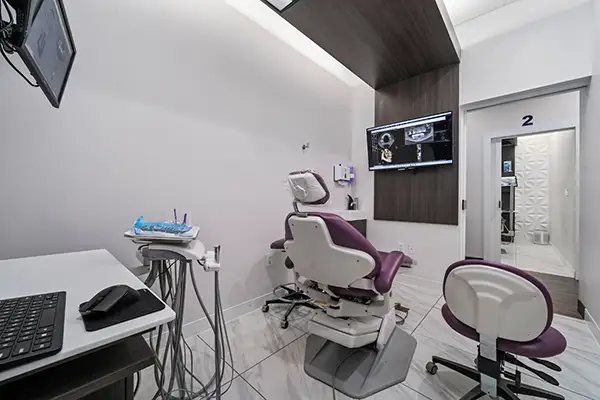Restorative Dentistry At Capitol Square Dental, our goal is to prevent dental problems before they occur. Unfortunately, this is not always possible due to poor oral hygiene, genetics, infrequent checkups, and other risk factors. This is why we also specialize in restorative dentistry. Our restorative services are designed to improve the function and aesthetics of your smile, as well as your overall oral health. At Capitol Square Dental, our goal is to prevent dental problems before they occur. Unfortunately, this is not always possible due to poor oral hygiene, genetics, infrequent checkups, and other risk factors. This is why we also specialize in restorative dentistry. Our restorative services are designed to improve the function and aesthetics of your smile, as well as your overall oral health.Dental FillingDental fillings are the best way to restore minor to moderate instances of tooth decay. Most fillings these days consist of a material known as composite resin. Composite resin is an aesthetically pleasing material that we color-match to the existing shade of your enamel. For this reason, a composite filling is virtually indistinguishable from the rest of your tooth. Dental CrownA dental crown is a tooth-shaped cap that improves the structure and cosmetics of a damaged or decayed tooth. During the procedure, your tooth must be completely reshaped to accommodate the shape of the crown. Once the tooth is reshaped, we will permanently bond the crown to the enamel using a special adhesive. Many crowns are fabricated these days with porcelain, due to its unmatched aesthetics. Dental BridgeA dental bridge is a tooth replacement that typically consists of two dental crowns linked together by a pontic, or false tooth. A traditional bridge is supported by the two surrounding teeth, known as abutment teeth, that we reshape to receive the crowns. A bridge can also be supported by a series of dental implants if multiple adjacent teeth are missing. If you are missing a tooth, a bridge will prevent the remaining teeth from shifting out of their proper position. Dental ImplantA dental implant is a small titanium post that we surgically embedded into the jawbone. The implant serves as the root component of a prosthetic tooth. Once the implant is in place, it will fuse to the bone during the process of osseointegration. Osseointegration allows the implant to support a restoration against the strongest forces of your bite. For this reason, dental implants are widely considered to be the next best thing to your natural teeth. All on 4One of our most common treatments is All on 4, a complete fixed bridge supported by a series of dental implants. This immensely beneficial treatment concept has revolutionized the way we replace missing teeth. Smile MakeoverWe specialize in several treatments that, when combined, are referred to as a smile makeover. Most treatments involved with a smile makeover are a part of cosmetic dentistry, which focuses on improving the appearance of your teeth, gums, and even your facial appearance. If you are interested in a smile makeover, our team can help get the aesthetics of your smile back on track. DenturesA denture is a removable appliance that is usually used to replace one or more missing teeth. A partial denture usually attaches to the surrounding teeth with metal clasps. A complete denture consists of a flesh-colored acrylic base that supports a complete arch of prosthetic teeth. We offer custom-fit dentures as a more comfortable, functional, and durable solution. Inlays & OnlaysInlays and onlays are ideal for areas of decay too large for a filling, but not large enough to require the placement of a dental crown. The restoration is considered an inlay if it is placed within the occlusal (bite) surface of a tooth. The restoration is considered an onlay if it extends beyond one or more of the occlusal cusps. Tooth ExtractionThere are two types of tooth extractions: simple and surgical. We perform a simple extraction on a tooth that has already erupted above the gumline. We perform a surgical extraction on a tooth that has become impacted, or has yet to erupt, such as wisdom teeth. Extraction may be necessary to prevent the spread of infection and other complications. Wisdom Tooth ExtractionWisdom teeth typically erupt much later than other permanent teeth, which can cause problems for your oral health. At Capitol Square Dental, we provide wisdom teeth extractions to prevent or alleviate these potential problems. The extraction of impacted wisdom teeth typically takes place during a single appointment. Root CanalA root canal is a last-ditch effort to save a tooth from extraction. We may recommend a root canal if an infection has spread to the "pulpy" center of the tooth that contains nerve endings and other connective tissues. Once the infection has been removed, we fill the canals with a rubber-like material known as gutta-percha. A tooth that has received root canal treatment typically needs to be capped with a crown. Schedule an AppointmentTo learn more about our restorative services call (380) 383-3497, and schedule your appointment now! |
 Phone(380) 383-3497 HoursTues: 9:00am - 6:00pm Thurs: 8:00am - 3:30pm M, W, F, S - By appointment only |